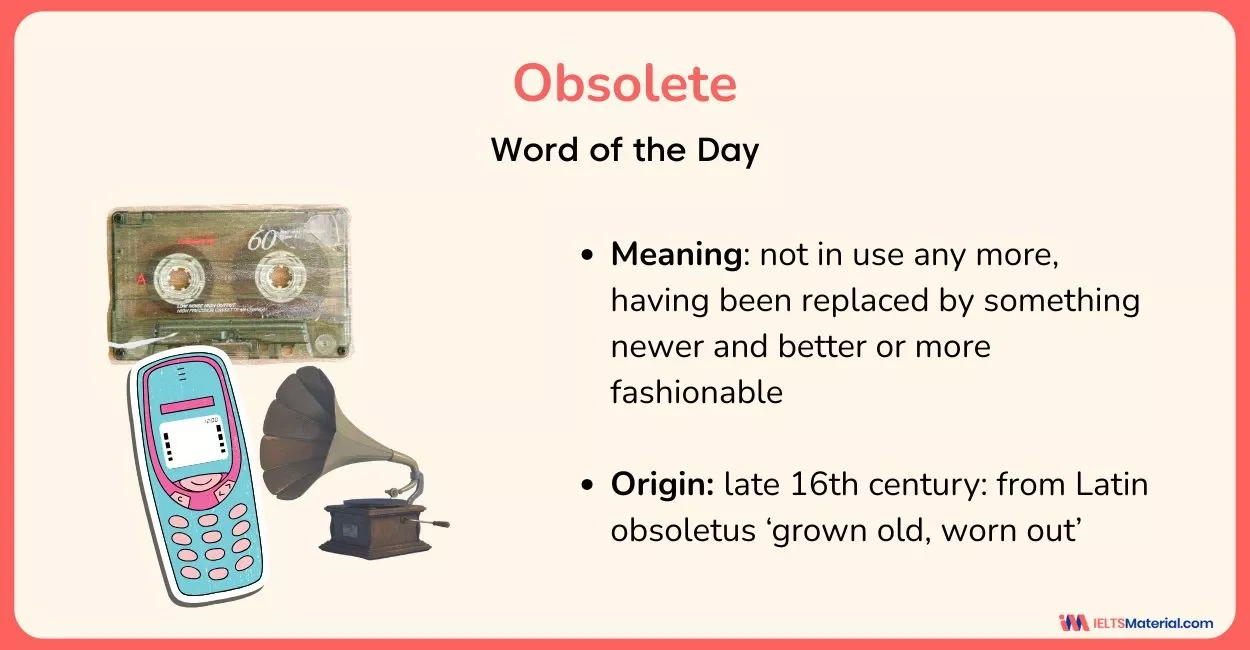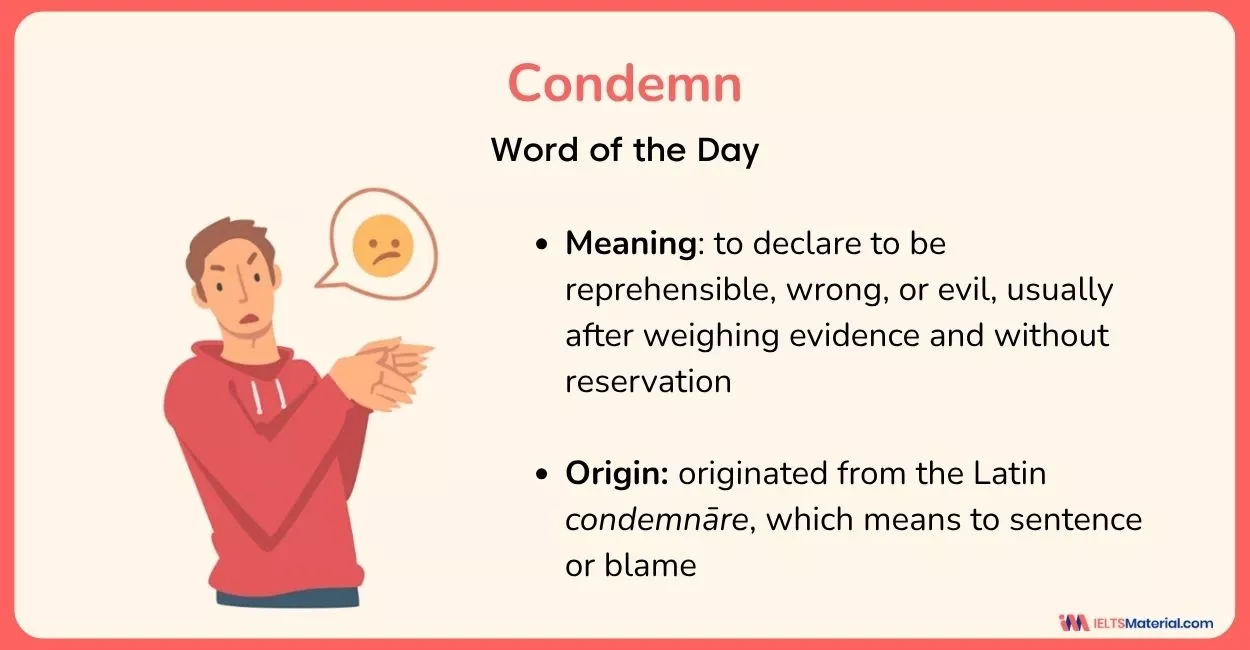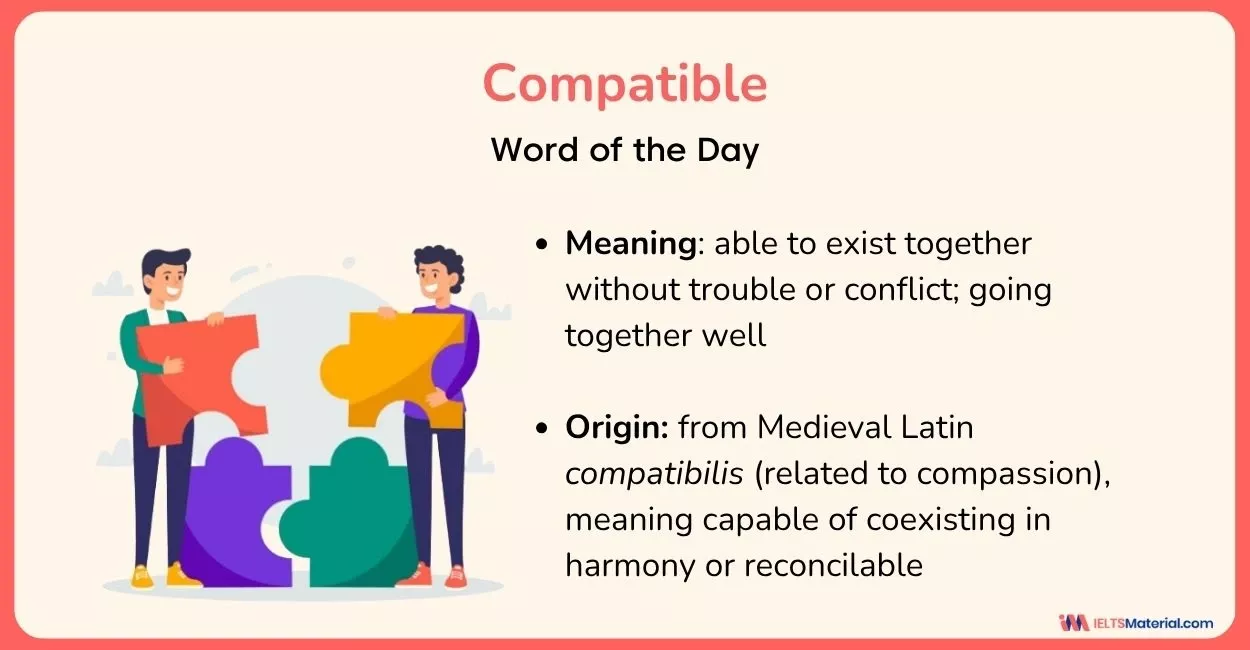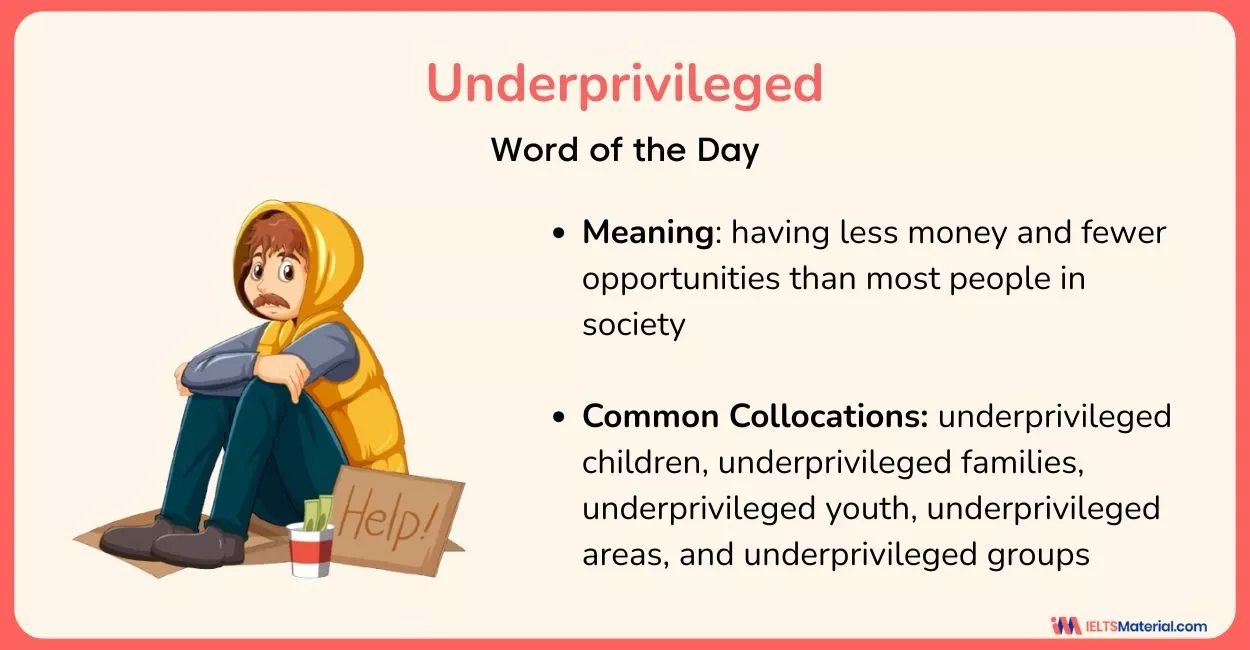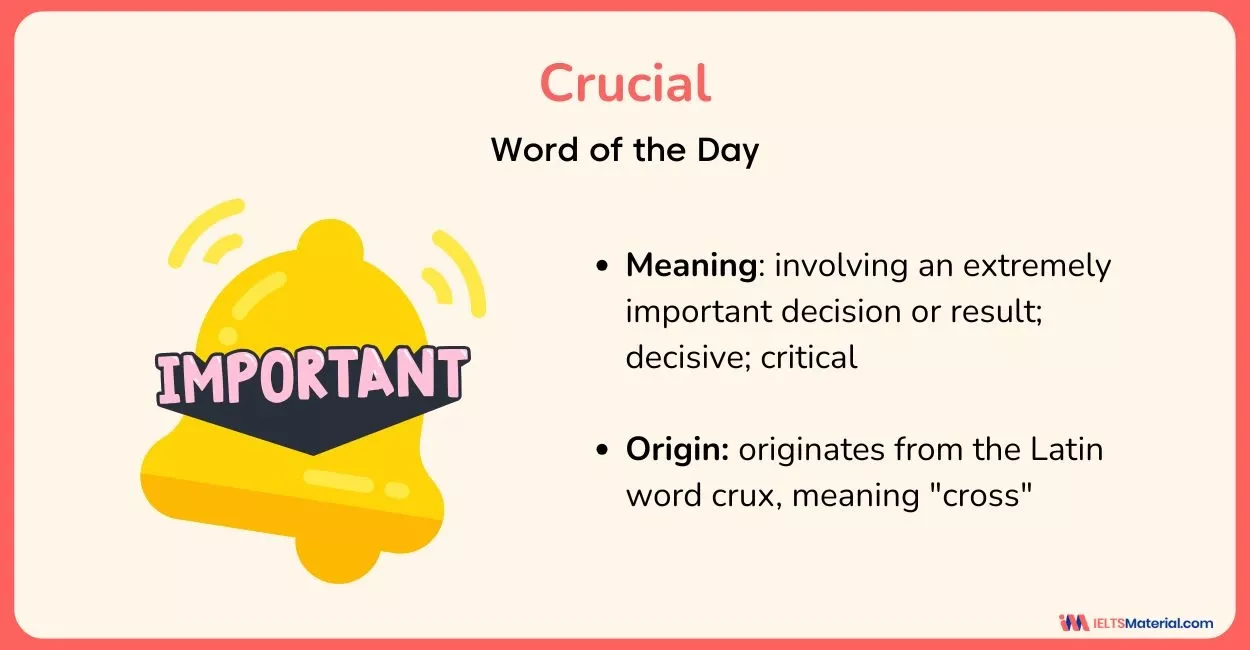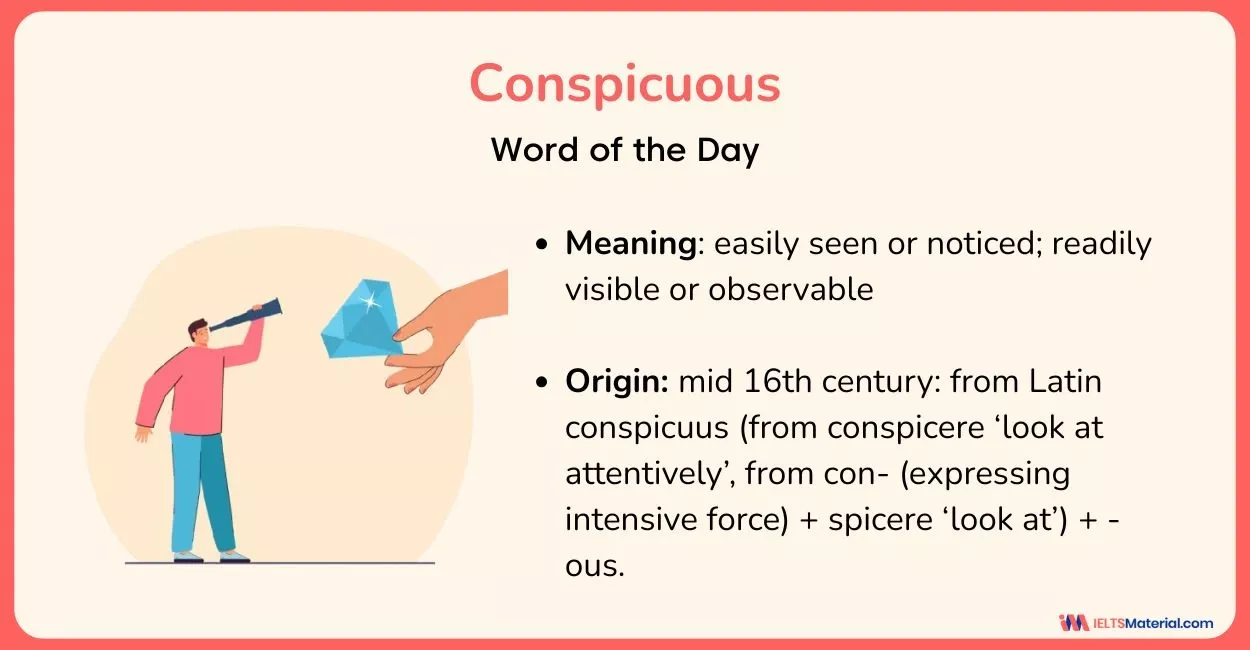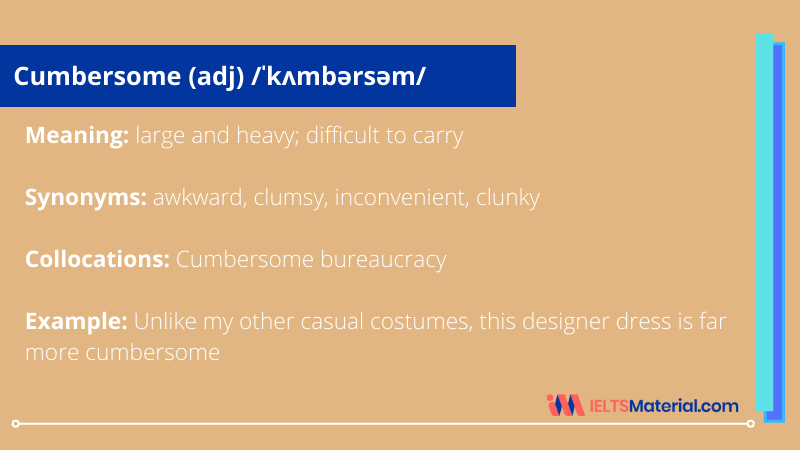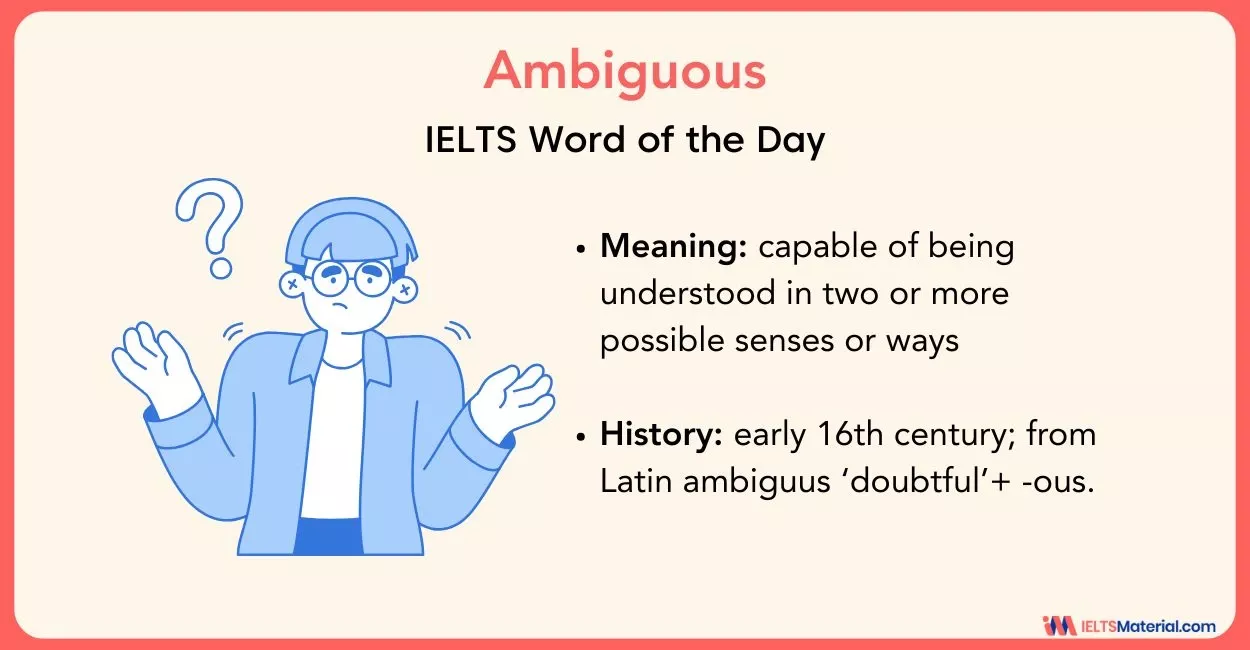Check out other Word of the Day Articles
Obsolete - Word of the Day for IELTS Speaking and Writing
In today’s fast-paced world, various things or habits that used to be part of our daily lives have lost their significance. For example, we no longer use a gramophone or radio to listen to songs; downloadable MP3 or streaming apps have replaced cassette tapes, etc. The word ‘obsolete’ is perfect to talk about such things, habits, or trends that have been substituted by new alternatives. So, learn the meaning, history, and proper usage of the term ‘obsolete’, solidify your understanding through practical exercises, and add it to your IELTS vocabulary words list for Band 8 or 9 to achieve your desired score. ...

6 min read
Updated On
Mundane: Word Meaning, Examples, Origin & Usage in IELTS
Despite its simple appearance, today’s word of the day, ‘mundane’, is incredibly useful in academic writing and speaking, especially when contrasting the everyday with the extraordinary. It offers a sophisticated alternative to words like ‘boring’, ‘ordinary’, or ‘commonplace’ and is ideal for describing daily life, routine tasks, or repetitive experiences. This blog post will cover the meaning, evolution, synonyms and antonyms of the word 'mundane' along with its correct usage within the scope of IELTS, so we can strengthen our grasp of it with some practical exercises. Meaning of Mundane Pronunciation: /mʌnˈdeɪn/ (sounds like muhn·dayn) The word ‘mundane’ is an adjective that means ‘something...

5 min read
Updated On
Condemn: Word Meaning, Examples, Origin & Usage in IELTS
You might have come across the word ‘condemn’ on social media or in online discussions when people speak against crimes or criticize something. Using such powerful words while writing essays, participating in debates, or preparing for IELTS can significantly raise the sophistication of your language. However, knowing its correct usage is important. In this blog post, we will examine the meaning, origin, history, synonyms, and antonyms of the word, as well as its proper usage of the term ‘condemn’ within the context of IELTS, reinforcing our understanding through practical exercises. Meaning of Condemn Pronunciation: /kən’dem/ (sounds like kuhn·dem) The word ‘condemn’ means...

5 min read
Updated On
Compatible: Word Meaning, Examples, Origin & Usage in IELTS
The word of the day, ‘compatible’ may seem simple at first, but it carries deep significance in academic, technological, and interpersonal contexts. It is particularly useful because it allows you to precisely describe how elements fit together, an essential skill when explaining opinions, making comparisons, or evaluating solutions. In this blog post, we will explore the meaning, origin, history, synonyms and antonyms of the word and proper usage of the term ‘compatible’ within the context of IELTS. We have also put together some practical exercises to solidify our understanding. Meaning of Compatible Pronunciation: /KƏMˈPADƏB(Ə)L/ (sounds like kuhm·pa·ti·bl) The adjective ‘compatible’ means ‘capable...

5 min read
Updated On
Assimilate: Word Meaning, Examples, Origin & Usage in IELTS
The word ‘assimilate’ is one of the most powerful verbs, especially in contexts related to culture, learning, and adaptation. Whether you are preparing for IELTS, writing an academic essay, or simply expanding your vocabulary, understanding this word can significantly enhance the precision of your expression. In this blog, we will explore the meaning, origin, history, synonyms and antonyms of the word and proper usage of the term ‘assimilate’ within the context of IELTS, solidifying our understanding through practical exercises. Meaning of Assimilate Pronunciation: /əˈsɪmɪˌleɪt/ (sounds like uh·si·muh·layt) The word ‘assimilate’ means ‘to absorb and integrate information, ideas, or cultural elements into a wider or...

5 min read
Updated On
Underprivileged: Word Meaning, Examples, Origin & Usage in IELTS
In the IELTS exam, you have to present arguments about social justice or development in the essays or the speaking module. In such scenarios, the word of the day ‘underprivileged’ comes in handy as it adds depth and accuracy to your responses. However, just adding it to your IELTS vocabulary words list for Band 8 or 9 might not be enough if you are unable to use it in correct contexts. So, in this blog post, we will explore the meaning, origin, history, and proper usage of the term ‘underprivileged’ within the context of the IELTS exam, solidifying our understanding through practical...

5 min read
Updated On
Crucial: Word Meaning, Examples, Origin & Usage in IELTS
The word ‘crucial’ is one of the common English words used in IELTS Speaking test that is used to express importance, necessity, and urgency. It helps emphasise essential ideas, key points, and determining factors in both writing and speaking. So, if you are aiming for clarity and a strong academic tone, it is a must-have word in your vocabulary toolkit. In this blog, we will look into the meaning, the roots, history of the word 'crucial', learn the correct way to use the word when taking the IELTS exam, with some top synonyms for common adjectives in IELTS Speaking & Writing, and take...

5 min read
Updated On
Conspicuous: Word Meaning, Examples, Origin & Usage in IELTS
The word ‘conspicuous’ is a powerful descriptive adjective used to highlight something that stands out sharply in its surroundings. For IELTS candidates, this word is particularly useful when describing trends, behaviours, noticeable changes, or prominent features in society. However, to use it appropriately for a good score, you need to know it. So, in this blog, we will discuss the meaning, history, and proper usage of the term ‘conspicuous’, solidify your understanding through practical exercises, and add it to your IELTS Vocabulary words list for Band 8 or 9 to achieve your desired score. Meaning of Conspicuous Pronunciation: /kənˈspɪkjuəs/ (sounds like kuhn·spi·kyoo·uhs)...

6 min read
Updated On
Cumbersome: Word Meaning, Examples, Origin & Usage in IELTS
Today’s word of the day is ‘cumbersome’. It is a powerful adjective that instantly adds precision and maturity to your English communication. Before using it for exams like IELTS, it is important to understand what it truly implies in everyday and academic English and to learn how to use the word. So, learn the meaning, history, and proper usage of the term ‘cumbersome’, solidify your understanding through practical exercises, and add it to your IELTS Vocabulary words list for Band 8 or 9 to achieve your desired score. Meaning of Cumbersome Pronunciation: /ˈkʌmbəsəm/ (sounds like kuhm·buh·sm) The word ‘cumbersome’ is an adjective that describes...

5 min read
Updated On
Plethora - Word of the Day for IELTS Speaking and Writing
The word ‘plethora’ is a highly useful academic term that instantly strengthens your IELTS Writing and Speaking responses. It helps you express the idea of ‘a large amount’ in a formal, precise, and sophisticated way. In this blog post, we will explore the meaning, origin, history, and proper usage of the term ‘plethora’ within the context of the IELTS exam, solidifying our understanding through practical exercises. Meaning of Plethora Pronunciation: /ˈplɛθ(ə)rə/ (sounds like PLETH-uhr-uh) While the Oxford Dictionary states that the word ‘plethora’ means ‘a large or excessive amount of something’, the Cambridge Dictionary refers to it as ‘a very large amount of...

5 min read
Updated On
Elated - Word of the Day for IELTS Speaking and Writing
Among the many English words that describe happiness, the word of the day ‘elated’ stands out because it conveys a deep, uplifting, and sometimes overwhelming sense of joy. It is stronger than ‘happy’ and more expressive than ‘glad’, making it perfect for formal writing and impactful speech. In this blog, we will look into the meaning, the origin, and the history of the word 'elated', learn the correct way to use the word when taking the IELTS exam, with some top synonyms for common adjectives in IELTS Speaking & Writing, and take some practice exercises to improve our understanding. Meaning of...

5 min read
Updated On
Avarice: Word Meaning, Examples, Origin & Usage in IELTS
In the advanced English vocabulary, few words capture the darker side of human desire as precisely as ‘avarice’. This term represents extreme greed for wealth or material gain, often used in literature, philosophy, and formal writing to discuss moral and ethical issues. In this blog, we will discuss the meaning, history, and proper usage of the term ‘avarice’, solidify your understanding through practical exercises, and add it to your IELTS Vocabulary words list for Band 8 or 9 to achieve your desired score. Meaning of Avarice Pronunciation: /ˈævərɪs/ (sounds like a·vuh·ruhs) The word ‘avarice’ is a noun that refers to an insatiable or...

5 min read
Updated On
Ambiguous: Word Meaning, Examples, Origin & Usage in IELTS
When preparing for the IELTS exam, clarity and precision in language are vital. However, English is full of words that express uncertainty and multiple meanings. One such powerful word is ‘ambiguous’, which you should include in your IELTS vocabulary words list for Band 8 or 9. In this blog, we will explore the meaning, origin, history, synonyms and antonyms of the word and proper usage of the term ‘ambiguous’ within the context of IELTS, solidifying our understanding through practical exercises. Meaning of Ambiguous Pronunciation: /æmˈbɪgjəwəs/ (sounds like am·buh·gyoo·uhs) The word ‘ambiguous’ is an adjective that refers to something having more than one possible meaning or not clearly...

5 min read
Updated On
Knackered: Word Meaning, Examples, Origin & Usage in IELTS
If you have ever felt completely drained of energy after a long day, the word ‘knackered’ perfectly captures that exhaustion. This informal yet expressive term is widely used in the UK and other English-speaking countries to describe being extremely tired, worn out, or broken down. So, whether it is after a grueling workout, a long shift at work, or when describing an old machine that no longer works properly, adding ‘knackered’ to your IELTS Vocabulary Words List for Band 8 or 9 is essential, as it fits naturally in everyday conversations. In this blog post, we will examine the meaning, origin, history, synonyms...

6 min read
Updated On
Volatile: Word Meaning, Examples, Origin & Usage in IELTS
The English language is filled with words that capture not just ideas, but also emotions and moods. One such impactful word is ‘volatile.’ This word describes something unstable, unpredictable, or prone to sudden change. From describing financial markets that rise and fall rapidly, to personalities that shift from calm to anger in a moment, the word ‘volatile’ adds intensity and precision to communication. Therefore, mastering this word will enhance both your academic and professional vocabulary, making your expression more compelling. In this blog post, we will explore the meaning, origin, history, synonyms and antonyms of the word and proper usage of the...

5 min read
Updated On
Spurious: Word Meaning, Examples, Origin & Usage in IELTS
In academic writing, legal discussions, and formal debate, truth and authenticity are critical. However, not everything that appears true is genuine. The word ‘spurious’ describes this most appropriately. Used to describe something that is false, fake, or illegitimate, the word has a strong tone of skepticism and critical thinking, perfect for sophisticated writing or IELTS essays when evaluating claims or ideas. In this blog post, we will explore the meaning, origin, history, synonyms and antonyms of the word and proper usage of the term ‘spurious’ within the context of IELTS, solidifying our understanding through practical exercises. Meaning of Spurious Pronunication: /ˈspjʊəriəs/ (sounds...

5 min read
Updated On
Sonder: Word Meaning, Examples, Origin & Usage in IELTS
Have you ever looked at a stranger in a crowd and suddenly realised they have a life just as vivid, complicated, and full as yours? That startling moment of awareness when you understand that every person you pass has their own complex story is captured by the word ‘sonder’. Though not traditionally found in standard dictionaries, you can use this word in appropriate IELTS contexts to achieve an IELTS band score of 7 and above. Therefore, in this blog, we will explore the meaning, history, and proper usage of the term ‘sonder’ within the context of the IELTS exam, solidifying our understanding...

5 min read
Updated On
Physiognomy: Word Meaning, Examples, Origin & Usage in IELTS
Have you ever looked at someone's face and instinctively felt you could tell what kind of person they were? That intuitive judgment, right or wrong, is physiognomy. It reflects centuries of history, art, psychology, and philosophy. Therefore, understanding this word opens a doorway into how language and perception shape our understanding of human nature. In this blog, we will explore the meaning, origin, and formal usage of the word of the day, ‘physiognomy’, examine IELTS-specific examples, and practice exercises to help you confidently use this powerful word in your speaking and writing. Meaning of Physiognomy Pronunciation: fi-zē-ˈä(g)-nə-mē (sounds like fiz·ee·aw·nuh·mee) The word...

5 min read
Updated On
Sanguine: Word Meaning, Examples, Origin & Usage in IELTS
Ever met someone who remains confident and cheerful, even when things go sideways? That is the essence of being sanguine. It is not just optimism; rather, it is the calm self-assurance paired with hope that defines this trait. So, no matter whether you are studying for the IELTS Speaking test or improving your advanced vocabulary word list for IELTS, understanding the word ‘sanguine’ can be very helpful. In this blog, we will discuss the meaning, history, and proper usage of the term ‘sanguine’ and solidify your understanding through practical exercises to help you use it in the exam for a band...

6 min read
Updated On
Fetid: Word Meaning, Examples, Origin & Usage in IELTS
Whenever you pass by a dustbin full of garbage or enter a moldy basement, an unpleasant smell hits your senses. You might have wondered what word you can use to describe it or have simply tagged it ‘bad odor’. Well, when you are preparing for the IELTS exam, using or repeating words will not fetch you a good score. So, you need to know that the exact word to describe that ‘bad smell’ is fetid. However, to use it appropriately for a good score, you need to know it. So, in this blog, we will discuss the meaning, history, and...

6 min read
Updated On
